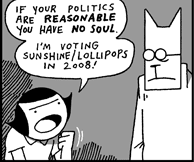Cat and Girl

Since 1999, Dorothy Gambrell’s Cat and Girl has graced the internet with its mordant critique of consumer society, indie rock, hipsters and everything that takes itself too seriously. A volume of more than 200 of these strips was published last year, making it available for the first time in a format suitable for reading on the subway.
There are actually two girls in Cat and Girl, versions of each other: the nerdier Girl and the punkier Girl. (You can tell them apart by their hair – one spike, or two.) There is only one Cat -- ostensibly male, bespectacled, and often dressed in a turtleneck. If Girl is the brain of the strip, Cat is the heart; he brings in the dada with his hare-brained schemes and sailor suits.
The best thing about Cat and Girl is how intelligent it is. Gambrell is a master of the caustic epigram, and can take down her targets with ruthless efficiency. Consider this twofer: Girl observes that calling a boy a “sissy” is an insult “typical of a society that considers the separation of male- and female-identified characteristics more important than the separation of church and state.” The gender binary and theocracy, with one well-aimed stone.
Almost all of Gambrell’s comics are good, but the best ones are soaked in incidental detail, and unravel like a pocket symphony of pop culture criticism. Take “The Blue Comic,” for example. As Cat and Girl roast marshmallows over a campfire, she decries the scandal of manufactured culture. “Marketplace of ideas!” she scoffs. “Ideas never stood a chance.” After a beat, she admits, “I wish I were popular.” “Do you know what’s popular?” counters Cat. “Christian rock!” And the strip ends with four panels of Cat strumming his guitar while singing the evangelical version of Weezer’s insipid "Sweater Song." (“If you want to destroy my savior…”)
Some may quibble that Cat and Girl is formulaic. Of course it is – but it happens to be a good formula! (One could argue that all great comic strips are formulaic.) Other people have told me that they find the strip too bitter, too mean. I would argue that Gambrell’s bitterness is not just choler; it’s critique. That is, she doesn’t merely insult -- she uncovers and undermines. The bitterness of Cat and Girl comes not from pessimism, but from unreasonably high expectations -- unreasonable politics. If you believe in art, freedom and, dare I say it, revolution – (in other words, if you believe in Sunshine and Lollipops) – how can you maintain that sweet tone of voice when everything of value is being flattened beneath the twin steamrollers of irrational exuberance and ironic detachment?
So why not vote for Sunshine and Lollipops?
Awesome review! I can't wait to check out the book.